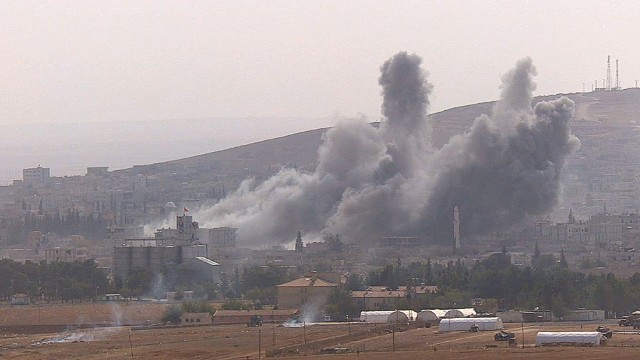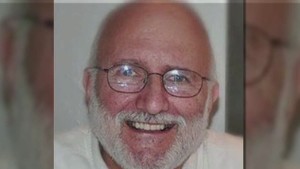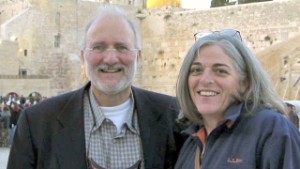It is another prisoner swap, this time with Cuba. New diplomatic relations are a top priority for the State Department and some rich Cuban that was an Obama campaign bundler could probably be the new Ambassador. Cuba’s bad behavior and past history has been rewarded by Barack Obama packaged under the wrappings of humanitarian and economic objectives.
This begs the question, does this ‘normalizing relations with Cuba have something to do with closing Guantanamo? What is the over and under bet on Obama turning over the military base completely to Castro and walking away from Guantanamo completely?
Obama has also demanded that Cuba release many of its prisoners. The Obama administration used Canada as the negotiations mediator.

Washington (CNN) — U.S. contractor Alan Gross, held by the Cuban government since 2009, was freed Wednesday as part of a landmark deal with Cuba that paves the way for a major overhaul in U.S. policy toward the island, senior administration officials tell CNN.
President Barack Obama spoke with Cuban President Raul Castro Tuesday in a phone call that lasted about an hour and reflected the first communication at the presidential level with Cuba since the Cuban revolution, according to White House officials. Obama is expected to announce Gross’ release and the new diplomatic stance at noon in Washington. At around the same time, Cuban president Raul Castro will speak in Havana
President Obama is also set to announce a major loosening of travel and economic restrictions on the country. And the two nations are set to re-open embassies, with preliminary discussions on that next step in normalizing diplomatic relations beginning in the coming weeks, a senior administration official tells CNN.

Talks between the U.S. and Cuba have been ongoing since June of 2013 and were facilitated by the Canadians and the Vatican in brokering the deal. Pope Francis — the first pope from Latin America — encouraged Obama in a letter and in their meeting this year to renew talks with Cuba on pursuing a closer relationship.
Gross’ “humanitarian” release by Cuba was accompanied by a separate spy swap, the officials said. Cuba also freed a U.S. intelligence source who has been jailed in Cuba for more than 20 years, although authorities did not identify that person for security reasons. The U.S. released three Cuban intelligence agents convicted of espionage in 2001.
The developments constitute what officials called the most sweeping change in U.S. policy toward Cuba since 1961, when the embassy closed and the embargo was imposed.
Officials described the planned actions as the most forceful changes the president could make without legislation passing through Congress.
For a President who took office promising to engage Cuba, the move could help shape Obama’s foreign policy legacy.
“We are charting a new course toward Cuba,” a senior administration official said. “The President understood the time was right to attempt a new approach, both because of the beginnings of changes in Cuba and because of the impediment this was causing for our regional policy.”
Gross was arrested after traveling under a program under the U.S. Agency for International Development to deliver satellite phones and other communications equipment to the island’s small Jewish population.
Cuban officials charged he was trying to foment a “Cuban Spring.” In 2011, he was convicted and sentenced to 15 years in prison for attempting to set up an Internet network for Cuban dissidents “to promote destabilizing activities and subvert constitutional order.”
Senior administration officials and Cuba observers have said recent reforms on the island and changing attitudes in the United States have created an opening for improved relations. U.S. and Cuban officials say Washington and Havana in recent months have increased official technical-level contacts on a variety of issues.
Obama publicly acknowledged for the first time last week that Washington was negotiating with Havana for Gross’ release through a “variety of channels.”

“We’ve been in conversations about how we can get Alan Gross home for quite some time,” Obama said in an interview with Fusion television network. “We continue to be concerned about him.”
Sen. Jeff Flake, R-Ariz., and Rep. Chris Van Hollen, Gross’ Maryland congressman, are on the plane with Alan Gross and his wife, Judy, according to government officials.
The group of members left at 4 a.m. ET Wednesday from Washington for Cuba.
Gross’ lawyer, Scott Gilbert, told CNN last month the years of confinement have taken their toll on his client. Gross has lost more than 100 pounds and is losing his teeth. His hips are so weak that he can barely walk and he has lost vision in one eye. He has also undertaken hunger strikes and threatened to take his own life.
With Gross’ health in decline, a bipartisan group of 66 senators wrote Obama a letter in November 2013 urging him to “act expeditiously to take whatever steps are in the national interest to obtain [Gross’s] release.”
The three Cubans released as a part of the deal belonged the so-called Cuban Five, a quintet of Cuban intelligence officers convicted in 2001 for espionage. They were part of what was called the Wasp Network, which collected intelligence on prominent Cuban-American exile leaders and U.S. military bases.
The leader of the five, Gerardo Hernandez, was linked to the February 1996 downing of the two civilian planes operated by the U.S.-based dissident group Brothers to the Rescue, in which four men died. He is serving a two life sentences. Luis Medina, also known as Ramon Labanino; and Antonio Guerrero have just a few years left on their sentences.

The remaining two — Rene Gonzalez and Fernando Gonzalez — were released after serving most of their 15-year sentences and have already returned to Cuba, where they were hailed as heroes.
Wednesday’s announcement that the U.S. will move toward restoring diplomatic ties with Cuba will also make it easier for Americans to travel to Cuba and do business with the Cuban people by extending general licenses, officials said. While the more liberal travel restrictions won’t allow for tourism, they will permit greater American travel to the island.
Secretary of State John Kerry has also been instructed to review Cuba’s place on the State Sponsors of Terrorism list, potentially paving the the way a lift on certain economic and political sanctions.
The revised relationship between the U.S. and Cuba comes ahead of the March 2015 Summit of the Americas, where the island country is set to participate for the first time. In the past, Washington has vetoed Havana’s participation on the grounds it is not a democracy. This year, several countries have said they would not participate if Cuba was once again barred.
While only Congress can formally overturn the five decades-long embargo, the White House has some authorities to liberalize trade and travel to the island.
The 1996 Helms-Burton Act, which enshrined the embargo into legislation, allows for the President to extend general or specific licenses through a presidential determination, which could be justified as providing support for the Cuban people or democratic change in Cuba. Both Presidents Clinton and Obama exercised such authority to ease certain provisions of the regulations implementing the Cuba sanctions program.
Gross’ lawyer, Scott Gilbert, told CNN last month the years of confinement have taken their toll on his client. Gross has lost more than 100 pounds and is losing his teeth. His hips are so weak that he can barely walk and he has lost vision in one eye. He has also undertaken hunger strikes and threatened to take his own life.

With Gross’ health in decline, a bipartisan group of 66 senators wrote Obama a letter in November 2013 urging him to “act expeditiously to take whatever steps are in the national interest to obtain [Gross’s] release.”
The three Cubans released as a part of the deal belonged the so-called Cuban Five, a quintet of Cuban intelligence officers convicted in 2001 for espionage. They were part of what was called the Wasp Network, which collected intelligence on prominent Cuban-American exile leaders and U.S. military bases.
The leader of the five, Gerardo Hernandez, was linked to the February 1996 downing of the two civilian planes operated by the U.S.-based dissident group Brothers to the Rescue, in which four men died. He is serving a two life sentences. Luis Medina, also known as Ramon Labanino; and Antonio Guerrero have just a few years left on their sentences.
The remaining two — Rene Gonzalez and Fernando Gonzalez — were released after serving most of their 15-year sentences and have already returned to Cuba, where they were hailed as heroes.
Wednesday’s announcement that the U.S. will move toward restoring diplomatic ties with Cuba will also make it easier for Americans to travel to Cuba and do business with the Cuban people by extending general licenses, officials said. While the more liberal travel restrictions won’t allow for tourism, they will permit greater American travel to the island.
Secretary of State John Kerry has also been instructed to review Cuba’s place on the State Sponsors of Terrorism list, potentially paving the the way a lift on certain economic and political sanctions.
The revised relationship between the U.S. and Cuba comes ahead of the March 2015 Summit of the Americas, where the island country is set to participate for the first time. In the past, Washington has vetoed Havana’s participation on the grounds it is not a democracy. This year, several countries have said they would not participate if Cuba was once again barred.
While only Congress can formally overturn the five decades-long embargo, the White House has some authorities to liberalize trade and travel to the island.
The 1996 Helms-Burton Act, which enshrined the embargo into legislation, allows for the President to extend general or specific licenses through a presidential determination, which could be justified as providing support for the Cuban people or democratic change in Cuba. Both Presidents Clinton and Obama exercised such authority to ease certain provisions of the regulations implementing the Cuba sanctions program.
Then there is the Venezuela component and additional financial ramifications.
Castro Deal With U.S. Fuels Shift Away From Venezuela
Cuba’s decision to reach an accord with the U.S. over prisoner exchanges in return for the easing of a five-decade embargo comes as the Caribbean island’s economy slows and its key benefactor, Venezuela, struggles to avoid default.
Cuba’s economy collapsed in the early 1990s when its closest ally, the Soviet Union, fell. With Venezuelan President Nicolas Maduro unable to contain the world’s fastest inflation and the country’s bonds trading at default levels, Cuba President Raul Castro has been working to diversify the Communist country away from Venezuela, which provides about 100,000 barrels of oil a day in exchange for medical personnel.
Since early 2013, Castro has eased travel restrictions, increased incentives to attract foreign investment and tried to reduce public payrolls. That hasn’t boosted the economy, which is poised to expand 0.8 percent this year according to Moody’s Investors Service, less than the 2.2 percent forecast by the government at the start of 2014.
“You only need to look at the economic disaster that is Venezuela and clearly it’s a bad bet to have all your chips in one basket,” Christopher Sabatini, policy director at Council of the Americas, said in phone interview from New York. “That 100,000 barrels per day gift of oil is going to end very soon.”
U.S. President Barack Obama today said he will use his authority to begin normalizing relations with Cuba, loosening a trade and travel embargo that dates back to the early days of the Cold War. The move came after Castro released an American aid contractor, Alan Gross, who had been imprisoned for five years and an unnamed U.S. intelligence agent.
Credit Cards
Under the new policies, U.S. travelers will be able to use credit and debit cards in Cuba and Americans will be able to legally bring home as much as $100 in previously illegal Cuban cigars treasured by aficionados.
U.S. companies will be permitted to export to Cuba telecommunications equipment, agricultural commodities, construction supplies and materials for small businesses. U.S. financial institutions will be allowed to open accounts with Cuban banks.
“It’s a huge step,” Philip Peters, a Cuba scholar and vice president of the Lexington Institute in Arlington, Virginia, said in a telephone interview. “The travel will help the economy, the sales from the private sector will help.”

 Kurds prepare for final battle with ISIS
Kurds prepare for final battle with ISIS


